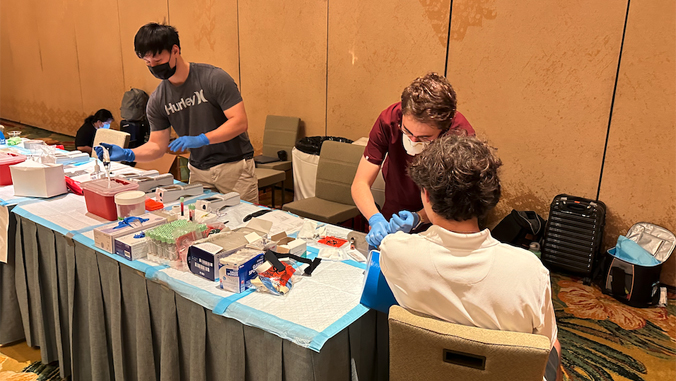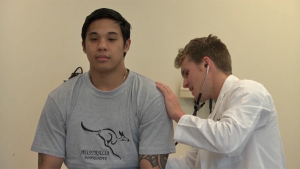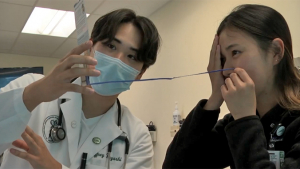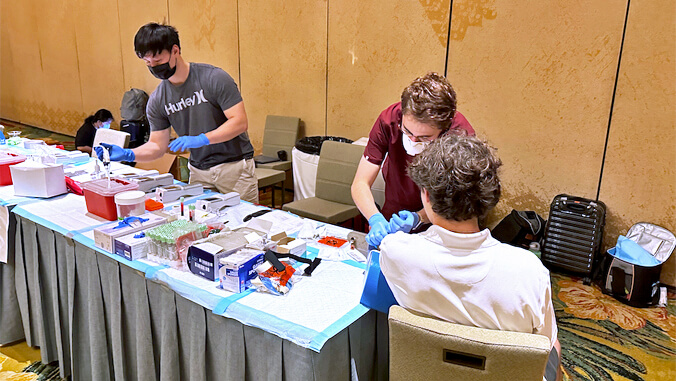Reading time: 3 minutes A Maui Wildfire Exposure Study event in 2024.
A Maui Wildfire Exposure Study event in 2024.
The University of Hawaiʻi received two privately funded grants totaling more than $1.5 million from The Leona M. and Harry B. Helmsley Charitable Trust to tackle pressing health disparities across rural Hawaiʻi and the U.S.-Affiliated Pacific Islands. Through community-centered health care and policy research, the projects aim to improve access, quality and coordination of care in some of the most medically underserved areas in the country and Pacific Islands.
“The Helmsley Charitable Trust is committed to ensuring that people in rural and remote communities can access the care they need and deserve,” said Walter Panzirer, a trustee for the Helmsley Charitable Trust. “These grants reflect that commitment by supporting the University of Hawaiʻi’s efforts to conduct rigorous, community-informed research that leads to practical, culturally responsive solutions. We are proud to support the University of Hawaiʻi to help strengthen health care systems across Hawaiʻi and the U.S.-Affiliated Pacific Islands, where the need is great and the opportunity for impact is profound.”
Assessing health care delivery

The first grant of $1.15 million will support a two-year, in-depth health policy and health care delivery system assessment in American Samoa and the Commonwealth of the Northern Mariana Islands. Led by UH’s Center for Pacific Islands Studies, Rural Health Research and Policy Center (RHRPC), and Pacific Cancer Programs at the John A. Burns School of Medicine (JABSOM), the initiative will work closely with territorial health leaders and community stakeholders to map systemic gaps, develop culturally relevant solutions, and produce technical reports and policy briefs for action at the local, national and philanthropic levels.
From strengthening emergency medical services and interisland transport to improving cancer care, telehealth and workforce development, the project will uncover new opportunities to address long-standing inequities and build more resilient systems of care throughout the Pacific.
“The cross-university team that came together in this proposal, including Co-Principal Investigators Aimee Grace (RHRPC), Neal Palafox and Lee Buenconsejo-Lum (JABSOM), is seeking to model next generation transdisciplinary opportunities to advance health and wellbeing research in Pacific Islands communities and honor UH’s continuing kuleana (responsibility) to the Pacific Islands region in which we are located,” said Principal Investigator Alexander Mawyer, director of the Center for Pacific Islands Studies.
Recommendations for rural health

The second grant—$383,844 over two years—focuses on opportunities to improve health in Hawaiʻi through policy changes. It will enable RHRPC to examine the state’s health care and emergency response systems, particularly in underserved communities across the islands, and identify barriers to optimal health and health care. Areas of focus will include cardiac care, telehealth, cancer care, emergency medical services, and more. The team will engage key stakeholders through site visits and compile policy options to address identified barriers at multiple levels, including federal, state, local, community and philanthropy.
“This generous grant from the Helmsley Charitable Trust represents a pivotal opportunity to focus on the policy drivers of health across our state,” said Grace, RHRPC principal investigator and UH Strategic Health Initiatives director. “By focusing on the unique challenges faced by Hawaiʻi’s rural populations, we aim to develop targeted and impactful policy recommendations that will ultimately strengthen the health and well-being of all Hawaiʻi residents.”
Together, the two projects demonstrate UH’s growing impact as a regional leader in rural health innovation and its deep commitment to uplifting community-driven policy solutions that create lasting change for the people of Hawaiʻi and the Pacific Islands.
“We are grateful to the Helmsley Charitable Trust for enabling us to assist key policymakers with important research that will go towards improving health care access in our state and Pacific Island communities,” said Interim UH Vice President for Research and Innovation Chad Walton. “Private investments like these further validate the quality and trust in the UH research enterprise, and help to keep us on course in this challenging federal funding environment.”
